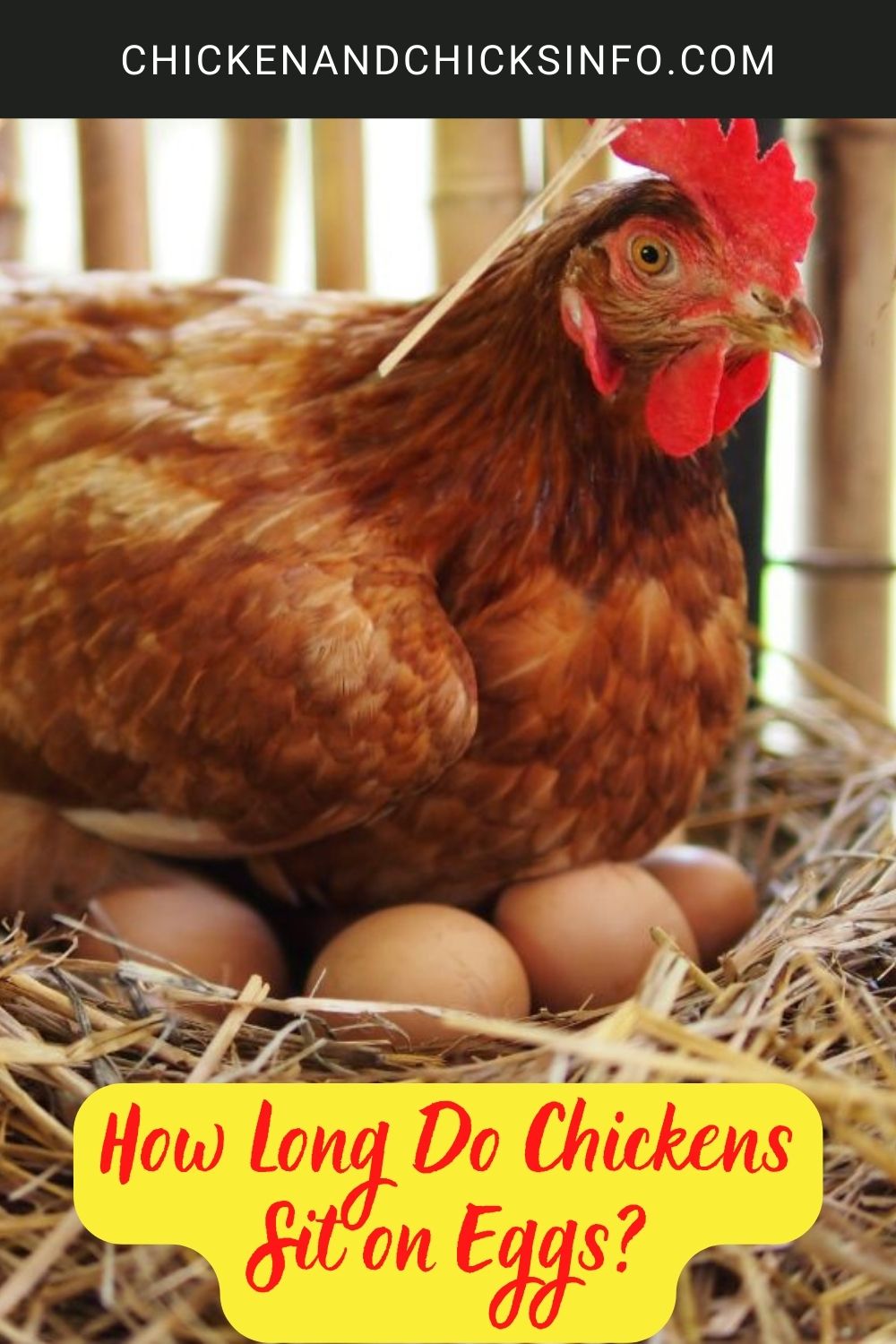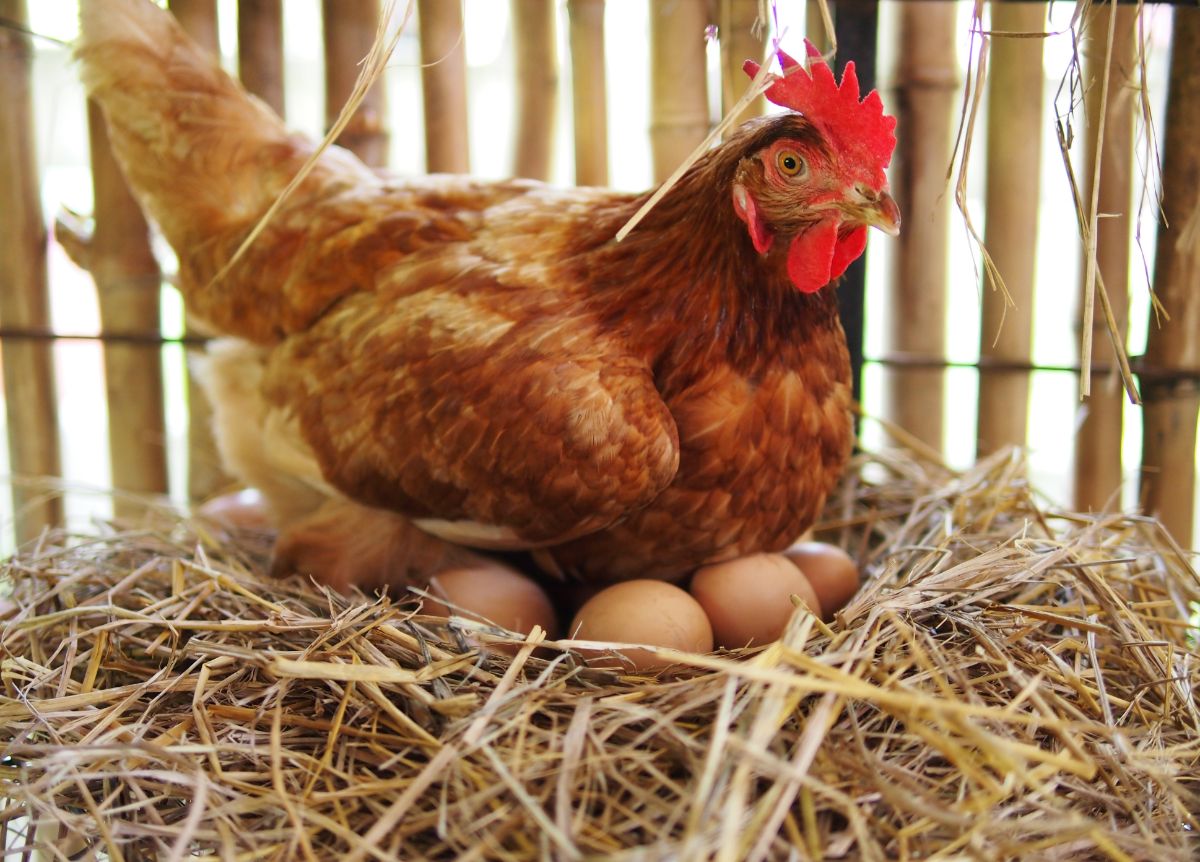
Chickens will sit on eggs for around 21 days as that’s the average time it takes for chicks to hatch. During this period, a broody hen will not lay any more eggs and can become quite defensive.
Here’s everything you need to know about why hens become broody. How they care for their eggs and chicks, and what you can do to help them if they need it.
Jump to:
- Why Do Chickens Sit on Eggs?
- What Is a Broody Hen - What Does It Mean?
- Broody Hen Symptoms: How to Tell If Your Hen Is Broody
- How Many Eggs Does a Chicken Lay Before Going Broody?
- How Many Eggs Can a Chicken Sit on to Hatch?
- Can You Move a Broody Hen and Her Nest?
- How Long Can a Broody Hen Leave Her Eggs?
- Are All Hens Natural Mothers?
- How Often Are Hens Broody?
- In Summary - TL; DR
Why Do Chickens Sit on Eggs?
I think we all know that hens sit on eggs to hatch them. But have you ever thought about why they need to sit on them?
While it’s certainly a miracle of nature, it’s not that complicated. Fertilized eggs need warmth for the embryo to develop.
When a chicken lays an egg it can be either fertilized or unfertilized. If a rooster has mated with a hen, there is a chance it will be fertilized.
In fact, a rooster can fertilize up to 14 eggs from mating with a hen just once. Which is why sometimes hens will lay a clutch of eggs over a period of fertilization and sit on those to hatch them.
A hen will sit on eggs for around 21 days providing the required warmth for the embryo to develop into a chick and eventually hatch into the world.
When a hen sits on eggs to hatch them it’s called being “broody”. On a related note; a group of hens is called a brood.
What Is a Broody Hen - What Does It Mean?
A hen that wants to hatch her clutch of eggs is known as broody. Different breeds become broody at different times and for different time periods, and there’s nothing you can do to “make” them broody.
It’s mostly hormonal, although environmental conditions also play a part. Typically a hen will go through a cycle of laying a clutch of eggs, then stop laying to sit on them until they hatch.
It’s hens doing mother things on instinct. It’s a wonder to witness in person, and a lot easier than incubating and hatching eggs yourself.
Broody hens can be difficult to handle though as I’ll explain in more detail in this article.
Broody Hen Symptoms: How to Tell If Your Hen Is Broody
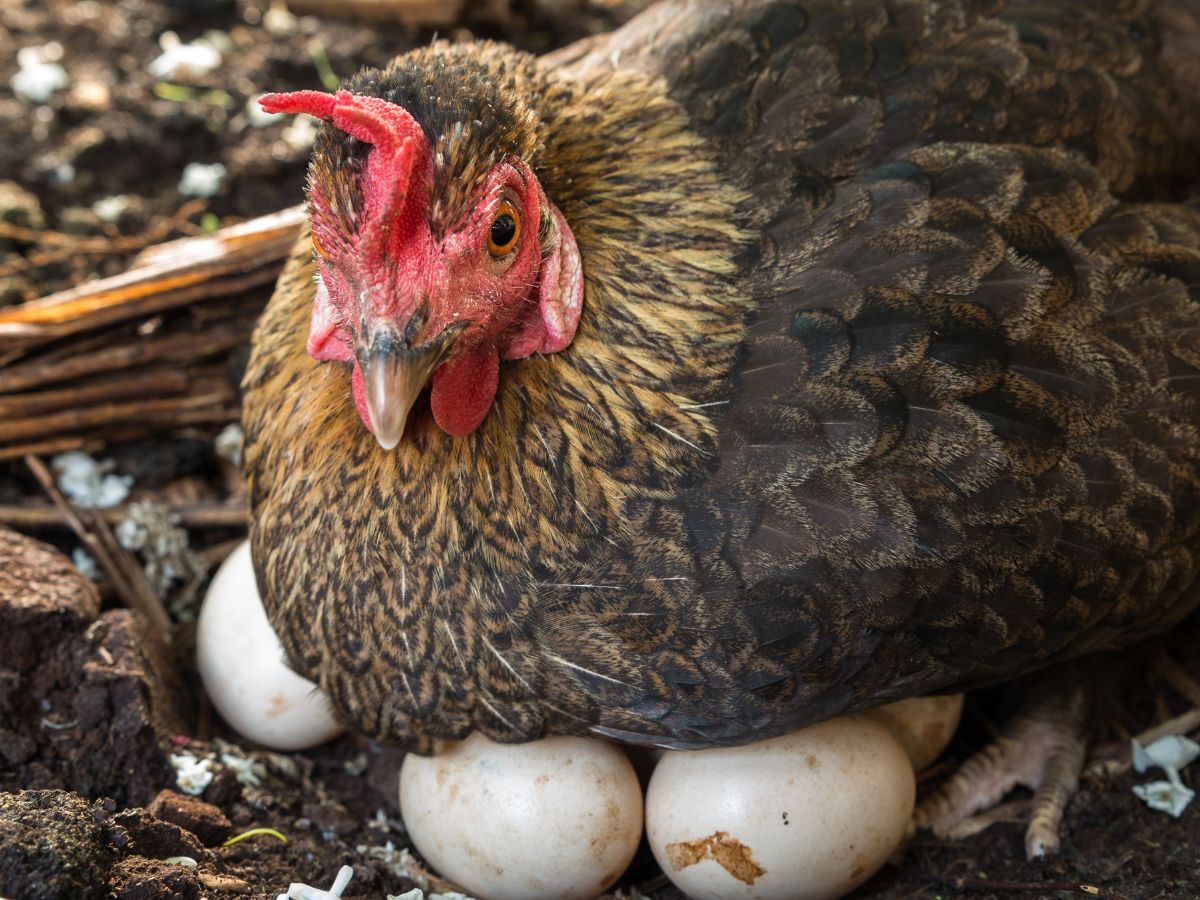
Here are some of the signs to look for if you suspect you have a broody hen:
- She’s pecking at your hand and being defensive over her eggs or when you’re close to her.
- Her comb and wattles are turning paler. (Check out what’s that red thing on a chicken for more on combs and wattles).
- Your hen is pooping more and it’s a lot more smelly than normal (this is hard to miss!).
- She is eating and drinking less than normal.
- She is retreating to a quiet, dark, private location.
- You notice some feathers are missing on her breast area. Hen’s do this as exposed skin is warmer for the eggs and they use the feathers as bedding.
Generally speaking, you notice a change in your hen’s behavior with most of her actions forming around the above points.
How Many Eggs Does a Chicken Lay Before Going Broody?
This is a question a lot of backyard chicken owners ask when they’re potentially waiting for one of their hens to start brooding over eggs.
There is no set answer, though.
Every hen is different as I explained above. The breed, individual chicken, and environment are all factors that affect how many eggs they’ll lay before mothering them.
I’ve heard owners saying their chickens never become broody. So, that’s hundreds of eggs without ever trying to hatch any.
While some owners just have broody hens that will lay a clutch of eggs and start sitting on them.
How Many Eggs Can a Chicken Sit on to Hatch?
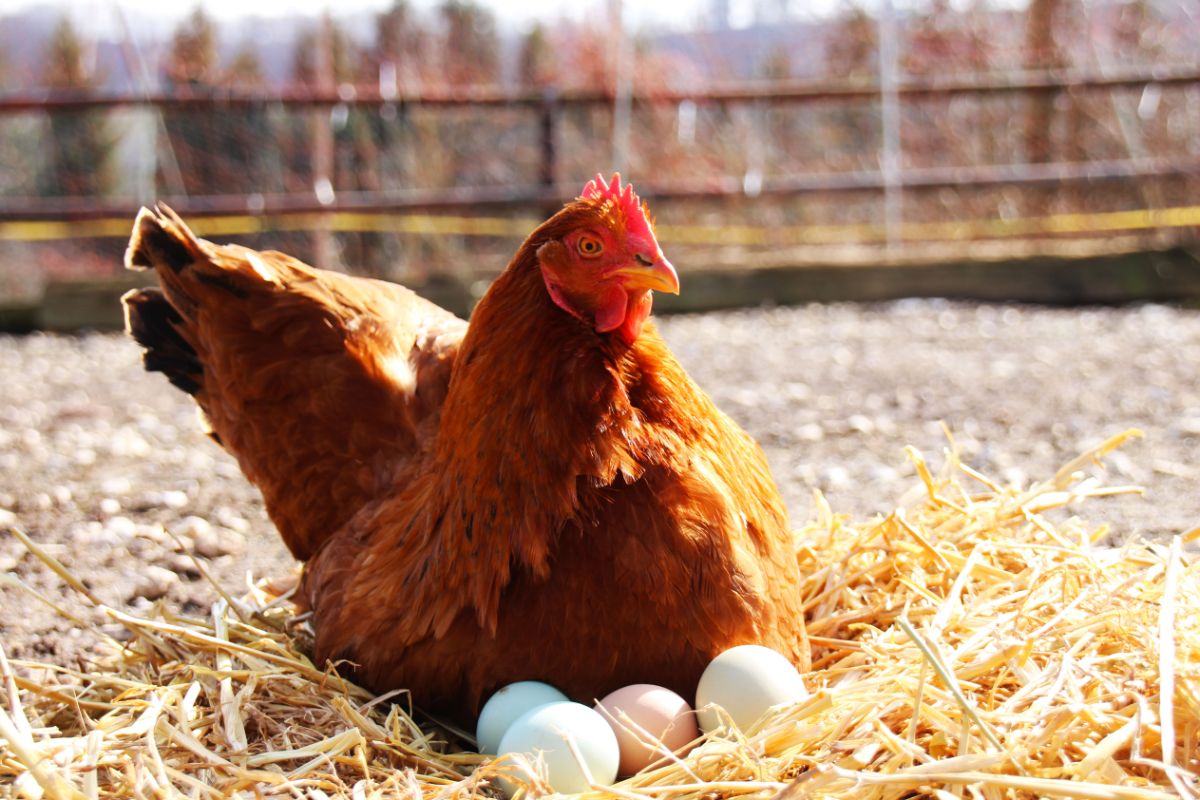
A hen will try and sit on as many eggs as she can cover, and it’s quite surprising how many eggs they can cover.
Most breeds can cover 10-12 medium-sized eggs at a stretch.
It’s not uncommon for chickens to sit on the eggs of other chickens, so it can get a little confusing as to what and who the eggs underneath a chicken belong to.
Where you can help here is to ensure they’re not trying to sit on too many eggs. If they are, you should remove the ones that are clearly not going to get the warmth they need.
You might be able to help provide some extra nesting materials and free up some more room for them too. It depends on where they decided to set up their nesting area, as it’s not their nesting box they’ll be using.
Related content - How many nesting boxes per chickens?
Can You Move a Broody Hen and Her Nest?
It’s not ideal, but if your hen sets up her nest in her nesting box or somewhere else that isn’t great, you can move her and her eggs.
Some chickens will be very defensive (who can blame them), so you do need to act with caution.
The best course of action is to set up a nice spot, complete with water and food, then try to move her at night. She’ll be less aware of what’s going on, it’s certainly better than doing it during the day.
How Long Can a Broody Hen Leave Her Eggs?
It’s not unusual for a broody hen to leave her eggs and go off for a wander.
I’ve known hens to be off their eggs for anywhere from a few minutes to a few hours. I’ve also read a bunch of stories from other chicken owners saying the same thing.
Ideally, the eggs need to be kept in the range of 97 to 102 degrees F. This is what temp you’d set in an incubator, and any prolonged exposure either side of this range can lead to eggs not hatching.
Yet, I keep hearing stories about chickens outside roaming for periods and their eggs getting a lot colder than this.
You can either pop your hen back on her clutch or leave her and assume she knows best. I know people who choose either option, and there isn’t really a right or wrong answer.
Are All Hens Natural Mothers?
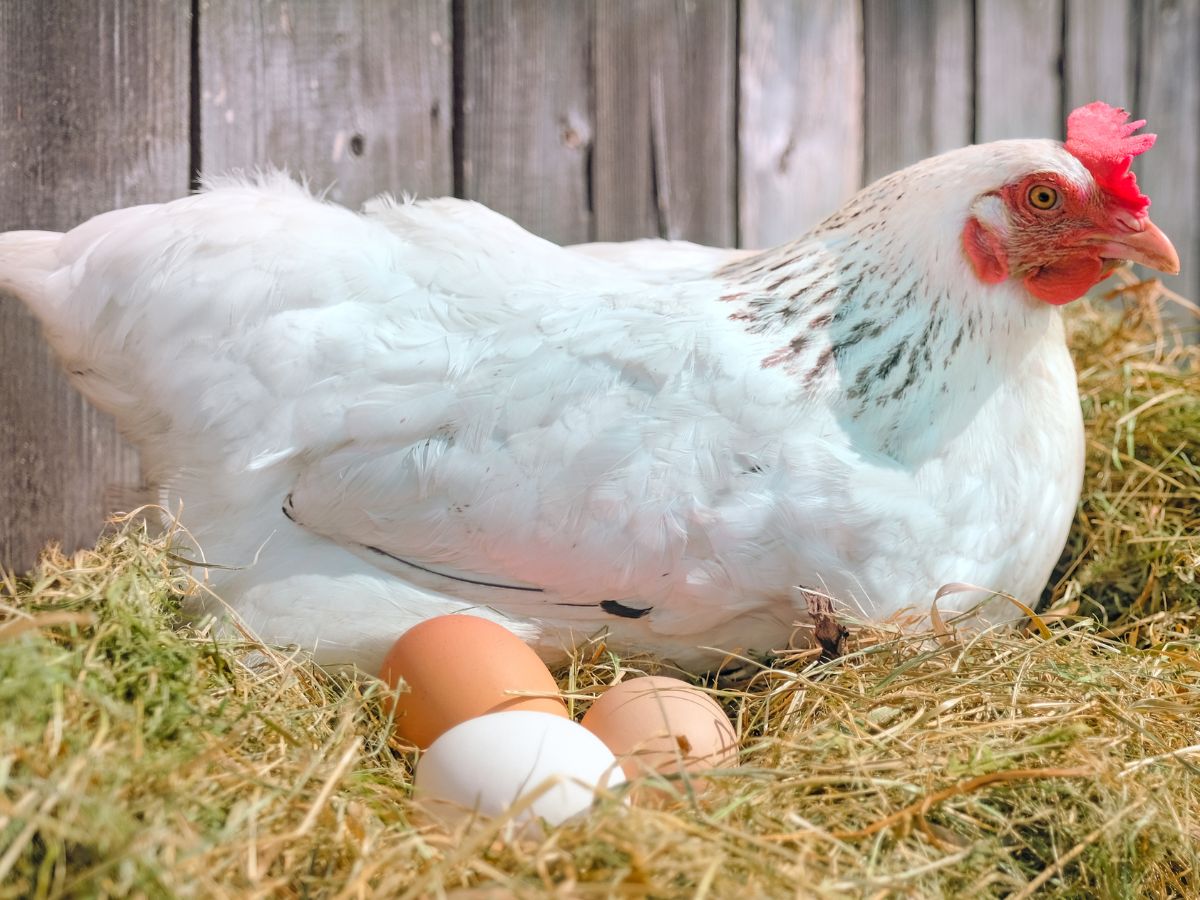
As with many animals in the animal kingdom, not all hens are great mothers and look after their offspring how they should.
Some hens will abandon their eggs before they are ready. I touched on hens wandering around above. If that few minutes turn into hours, then turns into a day, they’ve abandoned the eggs and you need to remove them.
It’s not known exactly why hens do this. It has to be to do with a feeling they have inside, something instinctual. But, as far as I know, there is nothing you can do to stop this happening.
Some hens will also kill their chicks when they hatch. This is quite upsetting and distressing to see, but again it’s part of nature that we can’t predict or stop.
One thing I will say, hens that behave like this will often repeat this behavior. Just as hens that are awesome mothers and look after their chicks will do so again.
For this reason, if you have an incident of neglect with a hen if they go broody again be ready to act. Also, if you had hopes of buying some expensive eggs for a hen to hatch, give them to a hen you know has had a successful hatch already.
Related content - Why do chickens eat their own eggs?
How Often Are Hens Broody?
Again, this comes down to the individual hen and isn’t something you have much control over.
Some hens will go in cycles throughout the year. They’ll lay a clutch of eggs and try to protect and hatch them before taking a break and doing it all over again.
It can take a physical toll on a hen that’s broody several times a year though. Which shouldn’t come as a surprise, it’s hard work keeping all those eggs nice and warm for 21 days at a time!
In Summary - TL; DR
If you’re skimming for the important bits of information, here’s what you need to know about broody chickens and the answer to; how long do chickens sit on eggs?:
- Hen’s will sit on eggs for around 21 days as that’s how long it takes for a chick to develop and hatch.
- They will sit on as many as 10-12 eggs if they can cover that many and provide enough warmth.
- Don’t be alarmed if they pop off their clutch now and then, hens need a break sometimes.
- Be aware that some hens will never be broody and sit on eggs, there’s nothing you can do about it.
- Some hens are prone to abandoning eggs midstream and killing newborn chicks.
- If you have a broody hen, be there in case of emergency but try to trust that she knows what she’s doing.
That’s it, sit back and enjoy one of life’s great wonders and welcome those cute little chicks into the world!
Related content - Huge list of names for baby chicks.
